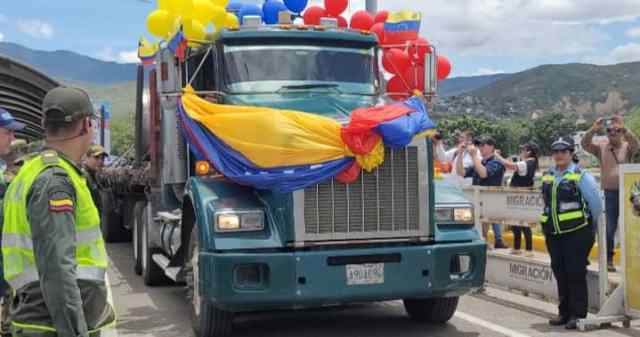Reapertura de la frontera colombo-venezolana ha sido un desastre para la economía local, según habitantes
Although the reopening of the international bridges, which link Venezuela with Colombia through Táchira State, has improved the mobility of residents on the border. Carlos Chacón, political leader in the border municipality of Bolívar, considers this aspect as the only positive thing, He assures that after 12 months of reopening the balance has been “a total disaster” for the local economy.
Luz Dary Depablos / Correspondent lapatilla.com
Chacón recalled that last year the regime authorities offered a “power border,” which would supposedly would recover after the restart of binational trade relations, but the Chavista mayor has kept quiet and has not set off alarms regarding the disastrous economic results of the first year of gradual reopening as he pointed out.
“When we review the income budget (local tax revenue), already executed by October 31st (2023) of the mayor’s office of the Bolívar Municipality, the numbers say otherwise. This report does not rule out (demonstrate) that alleged acts of corruption have also been committed with the few municipal resources (income) since the credits are poorly specified, there has been no comptroller’s office, because this government office has also taken a partisan point of view,” he noted.
He went on to explain that: “as of October 31st, only $103,000 had been raised. That means, 10 thousand dollars per month, if we extrapolate this as the result of the economic activity at a 1% rate, the overall activity, and let’s suppose that this is 1% of the gross sales, one million dollars per month is all the economic activity of the border in an entire month.”
He stated that during the administration of “Freddy Bernal, as ‘Protector of Táchira’ and other representatives of Chavismo and the former Governor of Táchira, Laidy Gómez, they themselves reported a dark economic activity that ranged between 100 and 150 million dollars of tax evasion per year.”
“If you compare the numbers of the ‘trochas’ (trail, illegal crossings) economy, when this was state policy, the ‘trochas’, with the results of the formal economy after reopening, it is a disaster,” he said.
In addition he highlighted the collapse of roads at the most important crossings to enter the state an on to the rest of the country through the border. These ways are almost blocked by the poor state of the roads.
“Domestic (cooking) gas only reaches the homes of the Bolívar Municipality twice a year, and then a null water service, not to mention electricity as there are 6 and 7 hours daily without power, mostly between 8:00 am and 6:00 pm, that is, during productive hours,” he said.
Therefore, the reopening of the binational border crossings, in his opinion, still does not yield positive numbers for the local economy, which is why he demands that the municipal government explain to border residents where the additional credit resources have been invested in, in addition to speak out in the face of the lack of results that benefit the residents of San Antonio del Táchira.









